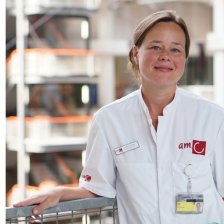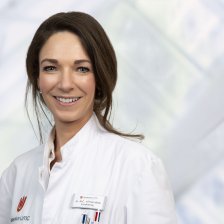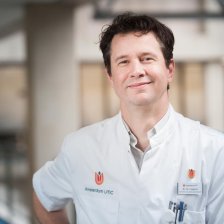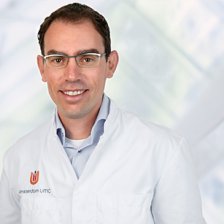Aim
To increase the quality of our research and training activities, we aim to further develop the potential synergies between the fields of pulmonary hypertension and critical care in a fully translational way.
We will intensify collaboration between participating departments and coordinate activities with respect to preclinical models, trial design, and training and recruitment of talented researchers.
Joint investments in infrastructure, technologies and expertise (technical support) are needed to consolidate the unique position of pulmonary hypertension and critical care research in Amsterdam.
Program Leaders
Young ACS
Research themes
Pulmonary hypertension
Pulmonary hypertension research at the VUmc is focused on phenotyping of patient cohorts and careful monitoring of right heart function. In an extensive program for translational research, new therapeutic approaches are tested in vitro, in animal models and subsequently in relatively small but well-structured proof-of-concept investigator initiated clinical trials. In addition, many patients are enrolled in large international randomized clinical trials of new PH medications.
Right heart failure
This research theme centers on understanding why patients with a similar degree of right ventricular (RV) afterload exhibit markedly different adaptive responses. While some patients successfully adapt through hypertrophy and enhanced contractility, others develop right heart failure characterized by severe RV dilation and increased diastolic stiffness. Unraveling the mechanisms underlying these divergent trajectories is key to identifying predictors of maladaptive remodeling and developing targeted therapeutic interventions.
Our research currently is focused on the following mechanisms and signaling pathways:
- BMP/TGFb signalling
- Inflammation
- Right atrial-ventricular interaction
In all experiments in vitro analyses of patients derived cells are combined with hemodynamic and imaging analyses in PAH patients. In this way, we aim to develop novel treatment targets and improve clinical decision making.
Pulmonary vascular remodeling
This theme aims to unravel mechanisms involved in disturbed endothelial barrier function and vascular rarefaction of the pulmonary circulation. This is not only limited to the condition pulmonary hypertension but also include patients with chronic lung diseases (COPD) and critically illness. In addition, the mechanism of in-situ thrombosis is investigated in detail to better understand the pathophysiological mechanisms underlying chronic thrombo-embolic pulmonary hypertension. For these investigations pulmonary endothelial cells are isolated of lung tissues obtained during lung surgeries (e.g. lung transplantation, pulmonary endarterectomy) or autopsy. In addition, genetically modified mice models in combination with advanced imaging techniques are used to identify specific therapeutic targets to improve barrier function and regeneration of the pulmonary circulation.
Microvascular failure and acute organ injury in critical illness
Critically ill patients represent a highly heterogeneous population, marked by complex interactions between coagulation, inflammation, and vascular dysfunction. This research line aims to optimize the quality and safety of perioperative and intensive care by uncovering the molecular mechanisms that drive organ failure, with a particular focus on hemodynamic instability, inflammation, infection, and coagulation.
We investigate how hemodynamic, metabolic and inflammatory disturbances impair vascular and organ function and explore organ-protective strategies, such as mechanical ventilation, extracorporeal support, and transfusion. Leveraging our extensive biobanking infrastructure, we study diverse critically ill populations to identify biomarkers to improve personalized treatment strategies. A robust translational approach underpins our work, combining cellular studies, clinically relevant animal models, and longitudinal clinical data. Close collaboration between basic scientists, clinicians, and industry partners ensures a multidisciplinary and impactful research environment.
Respiratory muscle stress in the critically ill
Patients with PH -and with other lung diseases- develop weakness of the (respiratory) muscles, a weakness which rapidly worsens during admission to the intensive care unit (ICU) and frequently leads to death.
VUmc and AMC departments (Physiology and ICU location VUmc and AMC) combine work on respiratory muscle biopsies with the monitoring of in vivo respiratory muscle function and patient-ventilator interaction to determine the pathophysiology of respiratory muscle weakness.
In collaboration with pharmaceutical companies, the ability of novel compounds to restore respiratory muscle function is tested in vitro as well as in patients.
Program members
-
 Aida Llucià Valldeperas
Aida Llucià Valldeperas -
 Alex PostmaDR.
Alex PostmaDR. -
 Alexander VlaarPI PROF.DR.
Alexander VlaarPI PROF.DR. -
Alexandra van DisselBSc MD MSc
-
Anco BoonstraPI DR.
-
Anita van de Munckhof
-
Anna Huis in't VeldDR.
-
 Anna-Linda PetersDR.
Anna-Linda PetersDR. -
Anne Beukers
-
Anne-Fleur Zwagemaker
-
Anniek Strijdhorst
-
Antonie Vonk NoordegraafPI PROF.DR.
-
 Antonius DriessenMD PhD
Antonius DriessenMD PhD -
Audrey OvergaauwMSC.
-
 Babu KurakulaPI DR.
Babu KurakulaPI DR. -
Bart BoerrigterDR.
-
Bas BossersDR.
-
Berke Gurkan
-
Berto BoumaPI DR.
-
Can IncePI PROF.DR.
-
 Charissa van den BromPI DR.ING.
Charissa van den BromPI DR.ING. -
Chi HauBA BEng
-
 Coen OttenheijmPI PROF.DR.
Coen OttenheijmPI PROF.DR. -
David van MeenenMD
-
Dorien Salet
-
Doris Skoric - Milosavljevic
-
 Esther NossentDRS.
Esther NossentDRS. -
 Frances de ManPI PROF.
Frances de ManPI PROF. -
Frits MulderDR.
-
Geert StreekstraPI DR.IR.
-
Harm Jan BogaardPI PROF.DR.
-
 Harm-Jan de GroothDR.
Harm-Jan de GroothDR. -
Harry BullerPI PROF.DR.
-
Hennie BikkerDR.
-
 Ingeborg KlaassenPI PhD
Ingeborg KlaassenPI PhD -
Ingrid Bistervels
-
Izabela Krzyzewska
-
Jan BaanPI DR.
-
 Jan VoorbergPI PROF.DR.
Jan VoorbergPI PROF.DR. -
Jannet Knijp
-
 Jeroen Niels WesselsMD
Jeroen Niels WesselsMD -
Jessie van Wezenbeek
-
Job Schippers
-
John KasteleinProf. MD PhD
-
 Joost MeijersPI PROF.DR.
Joost MeijersPI PROF.DR. -
Jord Seegers
-
Jorge PeterBEng BSc
-
 Josine de WinterDR.
Josine de WinterDR. -
Judith Ensink
-
 Jurjan AmanPI DR.
Jurjan AmanPI DR. -
Karel KochMD PhD
-
Kees van t VeerPI PhD
-
Lidwien TjadenMD
-
 Lilian MeijboomDR.
Lilian MeijboomDR. -
Lothar SchwarteDR.
-
 Ludo BeenenMD PhD
Ludo BeenenMD PhD -
 Marcella MullerPI DR.
Marcella MullerPI DR. -
 Marcus SchultzPI Professor PROF.DR.
Marcus SchultzPI Professor PROF.DR. -
Margaretha VroomProf. MD PhD
-
Margaux Cé
-
Mariëlle AldersDR.
-
 Marielle van de VeerdonkDR.
Marielle van de VeerdonkDR. -
Marije VisDR.
-
Marije Wijnberge
-
Marloes van den BergDR.
-
Martijn MeijerinkPI PROF.DR.
-
Martine KuiperMSc
-
 Michiel CoppensPI MD PhD
Michiel CoppensPI MD PhD -
Michiel Schuijt
-
Mo ArkaniMSC.
-
Myrte WennenMSc
-
Naoual Ouazzani Chahdi
-
Nick van EsPI
-
 Nina HauckPhD
Nina HauckPhD -
Noori Guman
-
Olaf MookDR.
-
Paola LombardiDR.
-
 Paola Serrano Martinez
Paola Serrano Martinez -
 Patrick SchoberPI PROF. DR. PROF.DR.
Patrick SchoberPI PROF. DR. PROF.DR. -
 Peter BontaPI MD PhD
Peter BontaPI MD PhD -
Pieter Roel TuinmanPI PROF.DR.
-
Pieter Willem KamphuisenPI Prof. MD PhD
-
 R. Nils PlankenPI DR.
R. Nils PlankenPI DR. -
Rienk NieuwlandPI PhD
-
Robert KlandermanMD
-
 Rocco Caliandro
Rocco Caliandro -
Ronald Lekanne Dit DeprezDR.
-
Sabrine HemmesMD
-
Samuel Olapoju
-
Sanne de BruinMSc
-
Sanne ten Berg
-
Saskia MiddeldorpPI PROF.DR.
-
Silvana van KoningsbruggenPhD
-
Sunny NijbroekMD
-
Sylvia BogaardsING.
-
 Tariq DamMSC.
Tariq DamMSC. -
Thei Steenvoorden
-
Thijs van Haaps
-
Tim MarcusPI DR.
-
Valeria Guglielmi
-
Vincent Kurucz
-
Ward van der Ven
-
Wil Kopatz
-
 Wilhelm Stehling
Wilhelm Stehling -
Wolfgang SchlackProf. MD PhD
-
Xiaoqing Sun
-
 Yen-Mie LaiDRS.
Yen-Mie LaiDRS.


